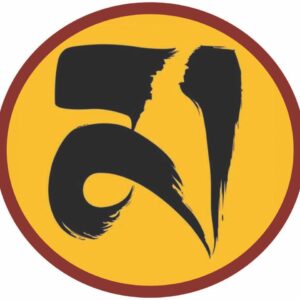 Buddha Kyab, Director of Manjushri Educational Services, a registered non-profit non-government organization promoting Early Literacy Development and Early Childhood Care and Education, spoke to Contact about the organisation’s work.
Buddha Kyab, Director of Manjushri Educational Services, a registered non-profit non-government organization promoting Early Literacy Development and Early Childhood Care and Education, spoke to Contact about the organisation’s work.
Contact: Tell us briefly about Manjushri Educational Services (MES)
Buddha Kyab: Manjushri Educational Services (MES) is an educational NGO based in Dharamshala working towards improving the quality of early childhood care and education in the exile Tibetan community.Established in 2016 by a team of passionate Tibetan educators, MES conducts training workshops and awareness programmes to educate young parents about the importance of Early Childhood Care and Education (ECCE) and its best practices. MES envisages a Tibetan community where all children between the ages of 0-10 years are raised in a healthy environment so that they grow into well-rounded adults. It strives to achieve its vision by educating community members about the importance of ECCE and making high-quality educational resources easily accessible to parents and young children.
Contact: What prompted the idea? And who initiated it?
Buddha Kyab: It was in 2016 that we, a group of likeminded people who have worked in education, came up with the idea. Jamyang Gyaltsen and Kalsang Wangdue were former Education Officers in the Department of Education, Central Tibetan Administration (CTA), and Kalsang Tsetan was a Social Science teacher at Tibetan Children’s Village school, Suja with over 20 years teaching experience. We all met and wanted to work as a team. Back then we had no intention of starting an organisation or NGO, we wanted to contribute something to the community as a team. To do that we had discussions about what’s lacking in Tibetan society and what we could do to fill that gap. We came to the conclusion that there is clear lack of good quality or satisfactory Tibetan language books for children. Even if there are Tibetan books, they are of not up to the standard of those available in English, both in content as well as quality. So that’s how we decided to work together to fill that gap in the community.
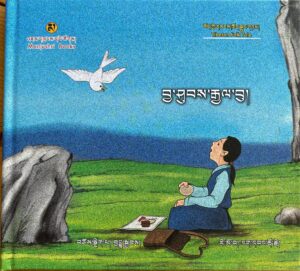 First, we published five Tibetan language books which came out better than our expectations and that inspired us to continue. Through the Education Department of the CTA, we have freely distributed about 5,000 copies of books we have published to Tibetan schools in India and Nepal.
First, we published five Tibetan language books which came out better than our expectations and that inspired us to continue. Through the Education Department of the CTA, we have freely distributed about 5,000 copies of books we have published to Tibetan schools in India and Nepal.
Based on our experience of working on the publication of those books, we realised the need for improvement in Tibetan children’s literature. As a team, we had no experience in that field. So to educate and train ourselves and those in the community who write, and have an interest in writing children literature, we organised a workshop, inviting experts in the field of children’s literature in India.
The Tibet Fund liked and appreciated our first five books and approved a reprint, for which they have decided to pay us the royalties. These reprinted books have been distributed to all the remaining Tibetan schools in the Tibetan exile community. The Tibet Fund is a nonprofit organisation based in New York, with an office in Dharamshala. With Tibet Fund’s support we have continued the book publication programme.
We have also created an awareness-raising initiative among Tibetan parents, with the message that children’s education starts with their parents, before the children start school. This time with their parents is considered “critical” in a child’s education, and indeed throughout their life. So our team started the ECCE programme as it is an area which we felt has not been focused on so far duringour 60 years of exile. We started the ECCE and Tibetan Baby Programmes in 2017. While we organise ECCE awareness programmes for Tibetan parents, we distribute baby boxes which contain baby books and toys appropriate for their age and growth.
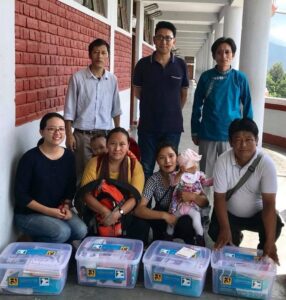
Photo: MES
We looked at the different children’s books available: board books, feel and touch books, flipflap books, folk tales and STEM (Science, Technology, Engineering and Maths) story books and realised that there are no STEM story books in the Tibetan language. STEM story books teach children the concept of science, social science and history through story telling before they learn them in school text books. We have collaborated with Pratham Books, one of the best children’s book publishers, to translate 25 books into Tibetan. We must also meet our funders’ requirement that the institution be registered. All our books have been much appreciated and loved in the community, and the ECCE programmes especially received immensely positive feedback; we have been encouraged to continue with our work and so registered MES as a non-profit organisation in 2019.
Contact: Can you please tell us in detail about the services and programmes of organisation? So that more Tibetans will become aware of them.
Buddha Kyab: All our services will come under these categories: children’s book publication and distribution, ECCE workshops for Tibetan parents, the Tibetan Baby Box project and Children’s Library.
We opened a children’s library,because although there are public libraries it is extremely rare to find a children’s library. Our library will not only lend books but will organise activities for children, read or tell stories and also screen movies.
So far we have given ECCE workshop to over 500 Tibetan families from Bylakuppee, Delhi, Dharamshala, Bir, Chauntra, Manali and Ladakh.
As for books, we have published 25 STEM books and there is online platform called Storyweaver on which we have made 50 translated books available. Any Tibetan from across the world can access it online. Since 2016 we have published about 100 books, including books which are translated as well as those written by us.
Contact: What is Early Childhood Care and Education (ECCE)? How do you promote ECCE in Tibetan communities?
Buddha Kyab: Early Childhood Care and Education is educating the parents about how to take care of their children before they start going to school which is time between the births till the age of three. Many parents want to send their children to a good school to get a good education, but don’t understand the importance of the time their children spend at home before school – this is considered a “crucial time” to build the foundation of their life.
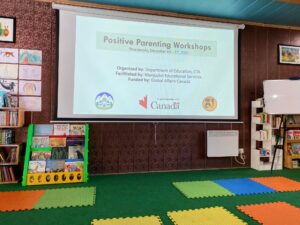
Photo: MES
To promote ECCE in the Tibetan community we have created online content specifically for Tibetan parents. We give workshops to the new parents and give baby boxes to the participating parents. In this way we educate parents on age-apt toys for their children’s sensory growth and sample books for their ages.
Our plan is to reach all Tibetan communities in India.
Contact: What are your challenges so far?
Buddha Kyab: The main challenge we face is the lack of understanding of the importance of ECCE and children’s books among Tibetan parents. We tend to get rejection rather than a welcome from parents when we plan to visit communities. However, many parents who do attend our ECCE have given us positive feedback; some only say they enjoy our baby box gifts.
When it comes to books, many Tibetan parents lack the habit or understanding of reading books. When they come to buy books, they will buy books with more text, feeling that if there are too many pictures it is not worth the money. Many picture books include only a written word or sentence, encouraging readers to use their imagination rather than reading itself. Such books are expensive for a reason. Tibetan parents coming here to get books tend to have the mentality that a few pages of pictures aren’t worth the price and they look for thicker books with more text. So we have a long way to go in terms of awareness among the parents themselves.
A survey we conducted showed that there are lots of younger parents who can read and write, or have attended school till class ten and beyond; those parents can easily participate and relate to our ECCE workshops.
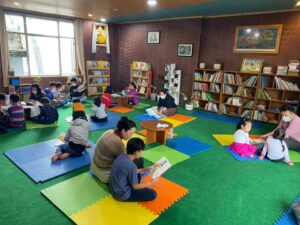
MES Children’s library in Dharamshala
Photo: MES
Contact: Which programme/service received the best participation and interest from your beneficiaries?
Buddha Kyab :We have found that the ECCE workshops have been extremely beneficial to many parents. Their feedback tells us that they feel they will be able to bring up their second child differently, and better than, their first after attending our workshops.
Secondly,for those parents who thought: as their children can’t read or write, why have the story books?;after attending our workshops, they now know that those story books or picture books should be read by parents to their children, and encourage them to use their imagination and to tell them stories through the picture books.
Contact:What is your plan for the next five years?
Buddha Kyab: We have just begun with Tibetan children’s book writings and publications. But compared to English language children’s books, we have a long way to go in terms of number,variety and quality of the books. In next five years, we plan to continue our work on those lines as well as that of increasing parents’ understanding of the importance of reading books and of introducing that habit to their children.
We have started giving virtual workshops to Tibetan parents living in the west which are much appreciated and we plan to continue this work.
Contact: We see that people donate children’s books to your institution. How can anyone, especially Tibetans across the world, contribute to your institution and in what way?
Buddha Kyab: As your children grow up, you can donate your children’s books and toys to us. We keep them at our library as well as giving them to parents who can’t afford to buy these things for their children.




 Print
Print Email
Email













